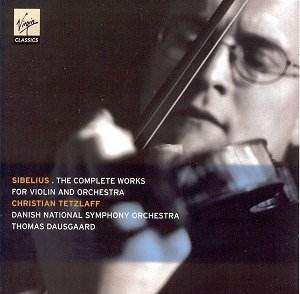The German violinist Christian Tetzlaff has been recording
for Virgin Classics for around a decade now and it is a bold step for
the partnership to produce a disc containing the complete Sibelius works
for violin and orchestra. It is a most welcome idea and breaks the common
mould of the twin concerto disc. Even bolder is for a violinist to enter
the lists with a repertoire concerto in such an intimidatingly competitive
field. The disc’s booklet claims there have been something in the region
of one hundred commercial recordings of the concerto. Some of the greatest
twentieth century violinists were among these. Heifetz, for example,
made a recording that for some is still the benchmark.
Tetzlaff has played the work many times with different
orchestras including a well received London Promenade Concert performance
last year and on this disc the playing oozes a confidence that must
partly result from that familiarity. His playing is characterised by
an attacking virtuosity and clean tone. You are made to feel he is coming
at you very strongly and this is emphasised by his being quite closely
recorded. It is very direct playing that is well matched by the excellent
Danish National Symphony Orchestra under their principal guest conductor,
Thomas Dausgaard. I liked the clear, reedy sound of the winds in the
slow movement but it is in the more vigorous passages that this performance
scores. For example the run up to the climax at the end of the first
movement is striking, Tetzlaff’s whirring arpeggiations in the foreground
making for exciting listening. Tempi are sensible and there is no doubt
this is a fine performance overall. But I could not help feeling there
was a little bit of something missing. One of the things that makes
Heifetz’s interpretation so great is the way he explores the mystery,
darkness and beauty of a concerto that might otherwise be played and
heard as a virtuoso, romantic war-horse. With him, the arresting opening
is deeply misterioso and the adagio moves and flowers so that
you can feel "the anguish of existence, fitfully lit up by the
sun". His virtuosity can be taken as read, so overall the performance
can give an impression of a greater work than the one Tetzlaff is playing.
Tasmin Little, if I may be so bold as to mention her
in the same breath as Heifetz, gives a similar impression. Her 1992
rendering has just been reissued as an EMI Classics production (coupled
with the Dvořák concerto). At a similar price to Tetzlaff’s disc
it makes for a useful comparison if it is chiefly the concerto you are
after. Her account does have that little bit of something I thought
missing in Tetzlaff’s - a feeling and sensitivity that carries with
it a greater sense of import. Vernon Handley with the Royal Liverpool
Philharmonic provides for a perfectly empathetic partnership. The recorded
sound, however, is not quite in the same class.
Of the other pieces on the Virgin disc, the set of
four Humoresques, op. 89 is probably the most interesting and
altogether covers a range of moods and effects that are well captured
in performance and recording. It was of this work Sibelius spoke: "the
anguish of existence, fitfully lit up by the sun", that I quoted
above. The last written of the works, the Suite for
violin and strings Op.117, is the least distinguished and Sibelius
did not intend it to be published. However, this three movement pastoral
affair deserves to be heard and there is much more to be enjoyed in
the other pieces.
John Leeman
